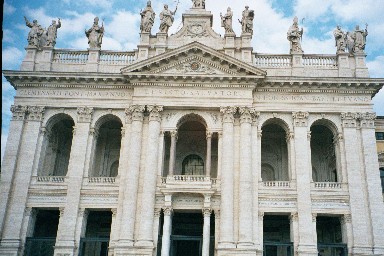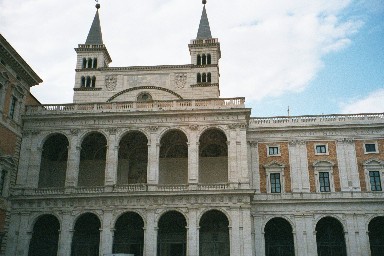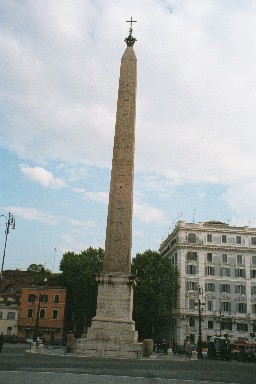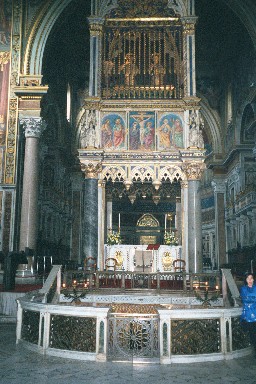From: 1 Corinthians 3:9c-11, 16-17
Apostolic Ministry (continuation)
[9] (For we are God's) building.
[10] According to the commission of God given to me, like a skilled master
builder I laid a foundation, and another man is building upon it. [11] For
no other foundation can any one lay than that which is laid, which is Jesus
Christ.
[16] Do you not know that you are God's temple and that God's Spirit
dwells in you? [17] If any one destroy's God's temple, God will
destroy him. For God's temple is holy, and that temple you are.
Commentary:
9. "God's field, God's building". The Second Vatican Council uses these
images to describe the inner nature of the Church: "The Church is a
cultivated field, the tillage of God (cf. 1 Cor 3:9). on that land the
ancient olive tree grows whose holy roots were the prophets and in
which the reconciliation of Jews and Gentiles has been brought about
and will be brought about again (Rom 11:13-26). That land, like a
choice vineyard, has been planted by the heavenly cultivator (Mt
21:33-43; cf. Is 5:1f). Yet the true vine is Christ who gives life and
fruitfulness to the branches, that is, to us, who through the Church
remain in Christ without whom we can do nothing (Jn 15:1-5).
"Often, too, the Church is called the building of God (1 Cor 3:9). The
Lord compared himself to the stone which the builders rejected, but
which was made into the cornerstone (Mt 21:42; cf. Acts 4:11; 1 Pet
2:7; Ps 117:22). on this foundation the Church is built by the Apostles
(cf. 1 Cor 3:11) and from it the Church receives solidity and unity.
This edifice has many names to describe it--the house of God in which
his family dwells; the household of God in the Spirit (Eph 2:19:22);
the dwelling-place of God among men (Rev 21:3); and, especially, the
holy temple. This temple, symbolized in places of worship built out of
stone, is praised by the Fathers and, not without reason, is compared
in the liturgy to the Holy City, the New Jerusalem. As living stones we
here on earth are built into it (1 Pet 2:5). It is this holy city that
is seen by John as it comes down out of heaven from God when the world
is made anew, prepared like a bride adorned for her husband (Rev
21:1f)" ("Lumen Gentium", 6).
The Lord wants Christians to be living stones in this building and has
associated them in the redemptive task of saving all mankind, so that
in the course of their own redemption they might also be co-redeemers
with him, completing "what is lacking in Christ's afflictions for the
sake of his body, that is, the church" (Col 1:24): "Jesus has wanted
every person to cooperate freely in the work of redemption [...]. The
work of salvation is still going on, and each one of us has a part in
it [...]. It is worth while putting our lives on the line, giving
ourselves completely, so as to answer to the love and the confidence
that God has placed in us. It is worth while, above all, to decide to
take our Christian faith seriously" ([St] J. Escriva, "Christ Is Passing
By", 129).
10-11. With a solemn introduction (" According to the commission of God
given to me", which equipped him for his ministry), St Paul identifies what
holds together the community at Corinth and its individual members--Jesus
Christ, the essential basis for every spiritual building. Christ, as St
Peter reminds us, is "the stone which was rejected by you builders, but
which has become the head of the corner. And there is salvation in no one
else, for there is no other name under heaven given among men by which we
must be saved" (Acts 4:11-12).
Therefore, all genuine catechesis must be Christ-centered; it must all be
focused on Jesus Christ, perfect God and perfect man, and on his teachings.
Catechesis, says John Paul II, means "to reveal in the Person of Christ the
whole of God's eternal design reaching fulfillment in that Person. It is to
seek to understand the meaning of Christ's actions and words and of the
signs worked by him, for they simultaneously hide and reveal his mystery.
Accordingly, the definitive aim of catechesis is to put people not only in
touch but in communion, in intimacy, with Jesus Christ; only he can lead us
to the love of the Father in the Spirit and make us share in the life of the
Holy Trinity [...]. We must therefore say that in catechesis it is Christ,
the Incarnate Word and Son of God, who is taught--everything else is taught
with reference to him--and it is Christ alone who teaches--anyone else teaches
to the extent that he is Christ's spokesman, enabling Christ to teach with
his lips" ("Catechesi Tradendae", 5-6).
Also, reflection on the fact that Jesus Christ is the foundation of the
spiritual building, leads to the conclusion that a Christian "needs to be
not only linked to Jesus Christ," St John Chrysostom points out, "but to
adhere to him, to be finally attached to him: to be separated from him to
the least degree is to be lost [...]. Notice all the comparisons the
Apostle makes to explain this intimate unity: Jesus Christ is the head, we
the body, for there can be no gap between head and body. He is the
foundation, we the building; he is the vine, we the branches; he the spouse,
we the bride; he is the shepherd, we the flock; he is the way along which we
are to travel; we are the temple, and God dwells therein; he is the
first-born, we his brethren; he is the heir and we co-heirs; he is life and
we have life through him; he is the resurrection and we men are raised up;
he is the light by which our darkness is dispelled" ("Hom. on 1 Cor", 8, "ad
loc.").
16-17. These words apply to the individual Christian, and to the Church
as a whole (cf. note on 1 Corinthians 3:9). The simile of the Church
as God's temple, frequently used by St. Paul (cf. 1 Corinthians
6:19-20; 2 Corinthians 6:16), shows that the Holy Trinity dwells in the
soul in grace. As [Pope] Leo XIII reminds us, by means of grace God
dwells in the just soul as in a temple, in a special and intimate
manner" ("Divinum Illud Munus" 10). Although this indwelling is
attributed to the Holy Spirit (cf. John 14:17; 1 Corinthians 6:19), it
really comes about through the presence of the Three Persons of the
Blessed Trinity, because all actions of God which terminate outside God
Himself (activities "ad extra") are to be seen as actions of the one,
unique divine nature.
This sublime mystery which we could never have suspected, was revealed
by Jesus Christ Himself: "The Spirit of truth [...] dwells with you,
and will be in you [...]. If a man loves me, he will keep My word and
My Father will love him, and We will come to him, and make Our home
with him" (John 14:17-23). Although this is a matter which we never
plumb in this life, some light is thrown on it if we remember that "the
Divine Persons are said to inhabit as much as they are present to
intellectual creatures in a way that transcends human comprehension,
and are known and loved (cf. "Summa Theologiae", I, q. 43, a. 3) by
them, yet in a way that is unique, purely supernatural, and in the
deepest sanctuary of the soul" ([Pope] Pius XII, "Mystici Corporis,
Dz-Sch", 35).
Reflection on this wonderful fact will help us to realize how extremely
important it is to live in the grace of God, and to have a horror of
mortal sin, which "destroys God's temple," depriving the soul of God's
grace and friendship.
Moreover, through this indwelling a human being begins to receiving an
inkling of what the Beatific Vision--Heaven--will be like, for "this
admirable union [of indwelling] differs only by virtue of man's
[present] condition and state from union whereby God fills the blessed
[in Heaven]" ("Divinum Illud Munus", 11).
The presence of the Trinity in the soul in grace invites the Christian
to try to have a more personal and direct relationship with God, whom
we can seek at every moment in the depths of our souls: "Get to know
the Holy Spirit, the Great Stranger, on whom depends your
sanctification. Don't forget that you are God's temple. The Advocate
is in the center of your soul: listen to Him and be docile to His
inspirations" ([St] J. Escriva, "The Way", 57).
Source: "The Navarre Bible: Text and Commentaries". Biblical text
taken from the Revised Standard Version and New Vulgate. Commentaries
made by members of the Faculty of Theology of the University of
Navarre, Spain. Published by Four Courts Press, Kill Lane, Blackrock,
Co. Dublin, Ireland.
From: John 2:13-22
The Cleansing of the Temple
[13] The Passover of the Jews was at hand, and Jesus went up to
Jerusalem. [14] In the temple he found those who were selling oxen and
sheep and pigeons, and the money-changers at their business. [15] And
making a whip of cords, he drove them all, with the sheep and oxen, out
of the temple; and he poured out the coins of the money-changers and
overturned their tables. [16] And he told those who sold the pigeons,
"Take these things away; you shall not make my Father's house a house
of trade." [17] His disciples remembered that it was written, "Zeal for
thy house will consume me." [18] The Jews then said to him, "What signs
have you to show us for doing this?" [19] Jesus answered them, "Destroy
this temple, and in three days I will raise it up." [20] The Jews then
said, "It has taken forty-six years to build this temple, and will you
raise it up in three days?" [21] But he spoke of the temple of his
body. [22] When therefore he was raised from the dead, his disciples
remembered that he had said this; and they believed the scripture and
the word which Jesus had spoken.
Commentary:
13. "The Passover of the Jews": this is the most important religious
feast for the people of the Old Testament, the prefiguring of the
Christian Easter (cf. note on Mt 26:2). The Jewish Passover was
celebrated on the fourteenth day of the month of Nisan and was followed
by the festival week of the Azymes (unleavened bread). According to the
Law of Moses, on those days every male Israelite had to "appear before
the Lord God" (Ex 34:23; Deut 16:16)--hence the pious custom of making
a pilgrimage to the temple of Jerusalem for these days, hence the crowd
and all the vendors to supply the needs of the pilgrims; this trading
gave rise to abuses.
"Jesus went up to Jerusalem": by doing this Jesus publicly shows that
he observes the Law of God. But, as we shall soon see, he goes to the
temple as the only-begotten Son who must ensure that all due decorum
is observed in the House of the Father: "And from thenceforth Jesus,
the Anointed of God, always begins by reforming abuses and purifying
from sin; both when he visits his Church, and when he visits the
Christian soul" (Origen, "Hom. on St John", 1).
14-15. Every Israelite had to offer as a passover sacrifice an ox or a
sheep, if he was wealthy; or two turtle-doves or two pigeons if he was
not (Lev 5:7). In addition he had to pay a half shekel every year, if
he was twenty or over. The half shekel, which was the equivalent of a
day's pay of a worker, was a special coin also called temple money (cf.
Ex 30:13); other coins in circulation (denarii, drachmas, etc.) were
considered impure because they bore the image of pagan rulers. During
the Passover, because of the extra crowd, the outer courtyard of the
temple, the court of the Gentiles, was full of traders, money-changers
etc., and inevitably this meant noise, shouting, bellowing, manure etc.
Prophets had already fulminated against these abuses, which grew up
with the tacit permission of the temple authorities, who made money by
permitting trading. Cf. notes on Mt 21:12-13 and Mk 11:15-18.
16-17. "Zeal for thy house will consume me"--a quotation from Psalm
69:10. Jesus has just made a most significant assertion: "You shall
not make my Father's house a house of trade." By calling God his Father
and acting so energetically, he is proclaiming he is the Messiah, the
Son of God. Jesus' zeal for his Father's glory did not escape the
attention of his disciples who realized that what he did fulfilled the
words of Psalm 69.
18-22. The temple of Jerusalem, which had replaced the previous
sanctuary which the Israelites carried around in the wilderness, was
the place selected by God during the Old Covenant to express his
presence to the people in a special way. But this was only an
imperfect anticipation or prefiguring of the full expression of his
presence among men--the Word of God became man. Jesus, in whom "the
whole fullness of deity dwells bodily" (Col 2:9), is the full presence
of God here on earth and, therefore, the true temple of God. Jesus
identifies the temple of Jerusalem with his own body, and by so doing
refers to one of the most profound truths about himself--the
Incarnation. After the ascension of the Lord into heaven this real and
very special presence of God among men is continued in the sacrament of
the Blessed Eucharist.
Christ's words and actions as he expels the traders from the temple
clearly show that he is the Messiah foretold by the prophets. That is
why some Jews approach him and ask him to give a sign of his power (cf.
Mt 16:1; Mk 8:11; Lk 11:29). Jesus' reply (v. 20), whose meaning
remains obscure until his resurrection, the Jewish authorities try to
turn into an attack on the temple--which merits the death penalty (Mt
26:61; Mk 14:58; cf. Jer 26:4ff); later they will taunt him with it
when he is suffering on the cross (Mt 27:40; A 15:29) and later still
in their case against St Stephen before the Sanhedrin they will claim
to have heard him repeat it (Acts 6:14).
There was nothing derogatory in what Jesus said, contrary to what false
witnesses made out. The miracle he offers them, which he calls "the
Sign of Jonah" (cf. Mt 16:4), will be his own resurrection on the
third day. Jesus is using a metaphor, as if to say: Do you see this
temple? Well, imagine if it were destroyed, would it not be a great
miracle to rebuild it in three days? That is what I will do for you as
a sign. For you will destroy my body, which is the true temple, and I
will rise again on the third day.
No one understood what he was saying. Jews and disciples alike thought
he was speaking about rebuilding the temple which Herod the Great had
begun to construct in 19-20 B.C. Later on the disciples grasped what he
really meant.
Source: "The Navarre Bible: Text and Commentaries". Biblical text
taken from the Revised Standard Version and New Vulgate. Commentaries
made by members of the Faculty of Theology of the University of
Navarre, Spain. Published by Four Courts Press, Kill Lane, Blackrock,
Co. Dublin, Ireland.





